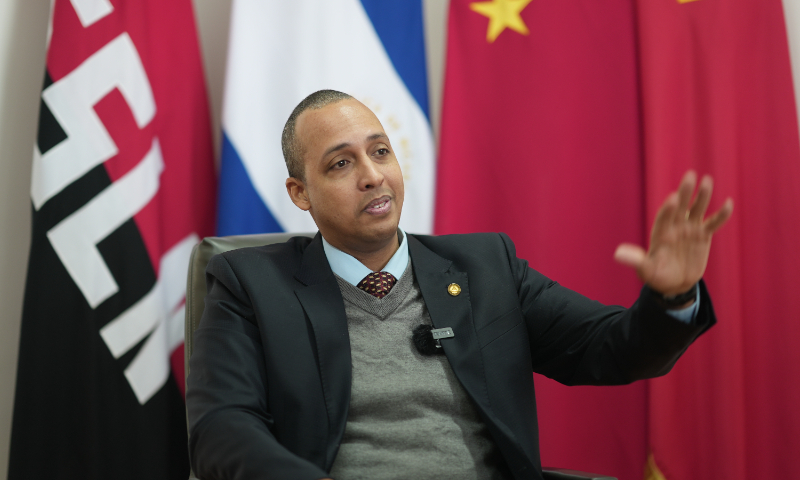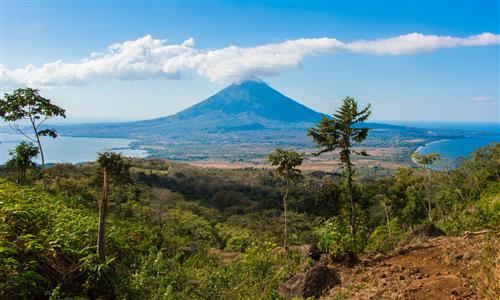Exclusive: China-Nicaragua economic ties set to create tangible benefits for Central America: ambassador
Bilateral economic ties to unlock greater potential under FTA: envoy

The Nicaraguan pavilion at the Sixth China International Import Expo in Shanghai on November 6, 2023 Photo: VCG
China and Nicaragua announced an upgrade in the bilateral relationship to strategic partnership in December 2023, after the two countries resumed diplomatic relations in 2021. On the first day of 2024, the China-Nicaragua Free Trade Agreement (FTA) entered into effect.
Embarking on a new starting point, China and Nicaragua are expected to further deepen bilateral cooperation and strengthen friendship between their peoples. Global Times reporter Liu Yang (GT) recently conducted an exclusive interview with Michael Campbell (Campbell), Nicaraguan Ambassador to China, in which Campbell shared three pillars of bilateral cooperation during the past two years and the bright prospects for economic and trade ties under the FTA. He also noted that China-Nicaragua economic ties will grow and create tangible benefits for the entire Central American region.

Michael Campbell, Nicaraguan Ambassador to China, in Beijing on January 4, 2024 Photo: Li Jieyi/GT
GT: In December 2021, China and Nicaragua resumed diplomatic relations. What results have been achieved in the economic and trade cooperation between the two sides within the framework of the Belt and Road Initiative (BRI) in the past two years?
Campbell: On December 10, 2021, China and Nicaragua reestablished diplomatic relations, and Nicaragua became a partner country of the BRI. That, in my opinion, is changing the way that the world cooperates. This initiative focuses on the development priorities of countries, focuses on the challenges that they face in terms of poverty alleviation and infrastructure gaps, and helps countries to finally overcome the poverty that they have faced for so many years.
It's an initiative that grants the opportunity for countries to make the proper use of their natural resources and the talent of their population to foster development and growth.
Likewise, we are a member of the Global Development Initiative, the Global Security Initiative and the Global Civilization Initiative. All these initiatives show that China wishes to share its development experience with the entire world, so that other countries have the opportunity to overcome poverty. The Global South is having the opportunity to finally overcome poverty because of the resources that China is providing.
Since the reestablishment of diplomatic ties with China, the people and government of Nicaragua have firmly defended the one-China Principle, China's sovereign and territorial rights and the just goal of national re-unification; and our countries have been working actively based on three pillars of cooperation:
The first pillar is solidarity cooperation, implemented by the Chinese International Development Cooperation Agency (CIDCA), the Ministry of Commerce (MOFCOM) and the Ministry of Foreign Affairs, and for which we are extremely grateful. Under this modality of cooperation, we are building homes, potable water and sanitation projects and expanding access to electricity. We have also received donations of COVID-19 vaccines, fertilizer, and equipment and materials for health and education.
We are strengthening the capacities of our agriculture and fishery institutes, by welcoming Chinese experts in these fields, who provide practical technical assistance that helps Nicaraguan producers to increase yields.
The second pillar of our cooperation is related to the strategic projects of the Nicaraguan Government with Chinese state-owned companies, which we are formulating under mixed public-private investment frameworks. These include key transportation, telecommunications, logistics and infrastructure projects, which allow Nicaragua to fully take advantage of its strategic geographical location at the heart of the Americas.
A clear example of the effectiveness of this second pillar of cooperation, has been the signing of the Construction Contract with CAMCE Engineering for the building of Nicaragua's new international airport, which took place during the Belt and Road CEO Business Conference, held in the framework of the 10th anniversary of the BRI. This project will improve connectivity and allow Nicaragua to increase fourfold the number of arrivals.
The third pillar of our cooperation is the promotion of trade and private investment, reiterating that Nicaragua aims to become a strategic partner of China in Central America and a regional platform for Chinese companies to access the regional market of 50 million inhabitants. Under this pillar we are actively promoting investment and trade in sectors such as agribusiness, fishing and aquaculture, mining, light manufacturing, banking and finance, telecommunications, pharmaceuticals, renewable energies and tourism.
On August 31, 2023, our respective ministries of commerce signed the comprehensive China-Nicaragua FTA, which entered into effect on January 1, 2024. Likewise, we have already subscribed to beef and seafood protocols with China Customs and Nicaraguan companies are already exporting their quality products into the Chinese market.
In November, Nicaragua participated in the 16th China-Latin America and the Caribbean (LAC) Business Summit, as well as in the 6th China International Import Expo (CIIE), creating the opportunity to showcase our excellent products and establish contact with several Chinese companies interested in visiting and doing business in the country. We expect the volume of trade between China and Nicaragua to grow exponentially during the course of this year, as cooperation, communication and exchanges allow investors to build confidence, establish partnerships and overcome information gaps.
GT: Two years after the resumption of diplomatic relations, China-Nicaragua relations have taken a qualitative leap, and the two countries have rapidly pushed forward the FTA process. What do you think are the reasons behind the rapid development of bilateral relations and economic and trade cooperation?
Campbell: The basis of China and Nicaragua´s relationship is the fraternal bond shared between the Communist Party of China (CPC) and the Sandinista National Liberation Front (FSLN), a bond that has endured the test of time and is now guiding the new era of diplomatic, economic and commercial relations.
China and Nicaragua share a special and complex relationship that spans several decades. Nicaragua's first diplomatic engagement with China took place in the early 1930s, with the opening of a Chinese General Consulate in Managua.
As is the case with many other Latin American and Caribbean nations, Chinese communities flourished throughout the country in the 19th century, establishing themselves in the capital city of Managua, as well as in Leon, Matagalpa, Granada and Bluefields, on the Caribbean Coast of Nicaragua. It is estimated that at its height, the Chinese population of Nicaragua reached some 20,000 individuals, who actively took part in the political, economic, social and cultural life of the country, allowing distinctive features of Chinese culture to permeate and enrich the Nicaraguan national identity.
Official diplomatic relations between China and Nicaragua were established in December 1985, 38 years ago, although the CPC and the FSLN had already been collaborating for many years, proudly hoisting the banners of socialism, national sovereignty, popular participation, anti-imperialism, the pursuit of world peace and the creation of a more just international order, as well as maintaining as a guiding principle and inalienable commitment the condemnation of all forms of colonial domination and exploitation.
Since the reestablishment of diplomatic ties, the communication and exchanges between our parties, governments and peoples have increased to never-before-seen-levels, building the trust that is necessary to build the kind of political and economic cooperation that we are witnessing today.
China and Nicaragua share similar development models based on the fundamental ideals of socialism and solidarity, which always place our people first and which have allowed us to implement effective poverty alleviation and social development programs.
We also share common views regarding the construction of a multipolar world, free of hegemony, in which the sovereignty, territorial integrity and independence of each state is protected, and the purposes and principles of the UN Charter are fully exercised.
GT: How will the FTA, which entered into force on January 1 this year, boost bilateral trade and economic exchanges?
Campbell: One of the first things that Nicaragua and China did after we reestablished diplomatic relations was that we signed an early harvest agreement. This was kind of a first step toward the negotiation of the FTA. The early harvest agreement allowed Nicaragua to export primarily agricultural products into China. Chinese families already have access to Nicaragua's beef, coffee, rum and other products. Likewise, Nicaragua has access to Chinese electronics and technology in some of these very important fields, products that we didn't have access to before.
China consumes everything that Nicaragua produces. The challenge for Nicaragua lies in increasing and adding value to our current production base, as well as producing additional goods and services that are attractive to the Chinese market.
In terms of trade in goods, the FTA will eventually implement zero tariffs on 95 percent of all our respective export products, of which 60 percent have benefitted from zero tariffs as of January 1, 2024.
In partnership with Chinese public and private companies, Nicaragua will promote the development of our agribusiness, mining, services, light manufacturing, renewable energy and tourism sectors, building strong and sustainable economic relationships, which will grow beyond our border and create tangible benefits for the entire Central American region.
We expect to see an immediate increase in coffee, beef, tobacco, honey, sugar, rum and seafood products, with a positive trend in the overall agribusiness sector over time. Tourism will also grow quickly, along with e-commerce and digital economy platforms, which will begin to operate in Nicaragua, creating new opportunities.
The Embassy of Nicaragua will take part in investment and trade promotion events in China, such as the China International Fair for Trade in Services and the CIIE. Likewise, Nicaragua has submitted its candidacy to the China Council for the Promotion of International Trade to be the host of the 17th China-LAC Business Forum, which is considered to be the main trade promotion event between China and the region.
GT: Looking ahead, in what areas do you see potential for cooperation between the two countries, such as trading in yuan and the digital economy?
Campbell: I think there is nothing that's off the table at the moment. During the course of last year, our central bank representatives, our ministry of finance representatives, our adviser for cooperation, investment and trade, have had meetings with different Chinese government officials to discuss a wide array of issues, including things like conducting economic cooperation in Chinese yuan. It's something that we will continue to discuss. Nicaragua is very interested in this.
It also has considerations related to e-commerce and the digital economy, in which China has made enormous leaps in recent decades.
GT: What do you think of the growing practical cooperation between China and Latin American countries?
Campbell: Many Latin American and Caribbean countries have longstanding diplomatic relations with China and have managed to build important economic and commercial ties. These ties will continue to grow as companies aim to export goods and services to the large Chinese market and Chinese foreign direct investment in the region continues to grow.
Politically, the China-the Community of Latin American and Caribbean States (CELAC) Forum has been a good space to promote China-Latin America and Caribbean relations, fostering political, economic, social and cultural cooperation. The strengthening of CELAC along its founding principles and its continued engagement with China can create many new opportunities in all fields.
Nicaragua will continue to promote China's incorporation into the Central American Integration System and the Association of Caribbean States, as we raise our voice in defense of the one-China principle and China´s right to pursue national reunification.

